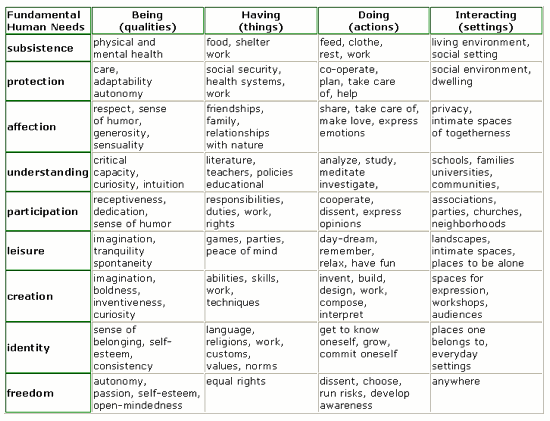Recently, I've perused an extensive masters thesis by a researcher and practitioner of nonviolent communication (nvc), Marion Little, which I discovered in the references on the wikipedia page for nvc. She formulated an nvc-oriented program to help adolescents with conflict resolution and empathy development. Little also delves into the history of nonviolent communication's evolution, along with various other mediation and dispute resolution models that have been formulated over the years, particularly within the last few decades. In my opinion all the others fall short of the comprehensiveness and core understanding of human nature (in terms of needs) that nvc offers.
Interestingly, the foundational aspect of the model of nonviolent communication has shifted over the last few decades. Initially, Marshall Rosenberg viewed action-oriented "wants" as pivotal in understanding humans. Then, he shifted to identifying "values" as key (which, incidentally, is how the philosophy of Objectivism views them). And then, Rosenberg's nvc model finally reached its current (and I'd say most accurate) form back in 1999, which centered on universal human needs. He has credited economist Max Neef with shedding light on this needs model illustrated below.

With nvc, needs are considered central to human functioning. Moreover, rather than being viewed in a hierarchical way as Abraham Maslow outlined (as everyone who's taken psych 101 in college has learned), needs are theoretically not ranked in nvc. As Little put it:
Although the concept of needs has persisted, the hierarchy Maslow proposed is no longer supported by modern theorists. Instead, current thinking tends to put forward ideas of fundamental needs and general needs, or primary and secondary needs, or simply a broad range of needs, where the needs support each other and are not mutually exclusive (Burton 1990a, 1990b; Clark 2003; Gordon, 2008; Rosenberg 2003). Theorists have come to recognize that Maslow’s original hierarchy has been confounded by, for example, communities and individuals who have scarce physiological resources yet still engage in practices that deeply meet self-actualization needs (such as artistic expression, divine connection, or life-purpose).
The concept of human needs stems from our biological nature, a nature that can be broadly viewed in both mental and physical terms. In order to sustain ourselves physically, we need such things as food, clean water, shelter, sleep, physical movement, and so on. These needs are understood by virtually everyone as incontrovertible. If you don't get them met, you'll die. For nearly all humans, being able to survive by meeting physical needs seems uncontroversial, for obvious reasons. However, I've noticed that meeting psychological, or mental, needs is not so readily embraced in our culture, lest one appear "needy." Such a stance is both tragic and untenable, because it downplays or even ignores a major aspect of human functioning that enables our flourishing: conceptual consciousness.
Indeed, on the psychological side of things, we have needs such as self-worth and self-confidence (self-esteem), understanding, (logical) clarity, learning, meaning, efficacy, growth, choice, autonomy, excitement, challenge, play, fun, joy, humor, self-expression, creativity, inspiration, celebration, beauty, purpose, and so on. To not get such needs met or met fully translates into a less fulfilling life. Additionally, in order to sustain ourselves as social animals, we require lots of other needs to be fulfilled as well, such as acceptance, respect, consideration, belonging, love, touch, sexual expression, nurturing, caring, freedom, authenticity, honesty, empathy, presence, to be known and heard, cooperation, support, peace, justice, fairness, ease, harmony, order, safety, protection, trust, equality, community, warmth, and so on.
Now, I wonder how many people would consider such needs optional in order to have a happy life. I suspect not many, even though many do believe that being a zealous advocate for getting needs met might appear "needy." Such is the consequence of not having needs recognized and met from a very early age. I refer you to my resources page to learn more about this. You'll find more detailed lists of these various needs, many of which overlap and are interdependent, here and here. In the realm of the psychological, it's fascinating to reflect on the dynamic nature in which needs-fulfillment happens—or doesn't happen, as the common case may be.
Tragically, most individuals who grew up in our present culture likely didn't identify the majority of their psychological needs explicitly. After all, most parents haven't learned about a vocabulary of feelings and needs and were probably taught to get what they wanted by not directly addressing their needs, but rather, by expressing them in terms of moralistic judgments (right/wrong, good/bad, should/shouldn't, and various other costly ways to express what we favor and disfavor), demands, and punishments. And this, of course, is how our overall culture—and our own precious lives in it—can become greatly diminished, representing only a small fraction of what our potential for life-enrichment truly is. As Little related:
Rosenberg says it has been his experience that, “from the moment people begin talking about what they need rather than what’s wrong with one another, the possibility of finding ways to meet everybody’s needs is greatly increased” (Rosenberg, 2003, p. 54). Nonviolent Communication facilitates self-directed needs-based empathic connections, between disputants, which are critical to resolving conflicts and to sustaining relationships beyond the moment of conflict (Rosenberg, 2003). Rosenberg’s work makes the critical connection between needs and emotional states. He identifies needs as the root of feelings, claiming that feelings are stimulated by needs which have either been met or which are going unmet. Accordingly, what a person thinks or imagines about needs being met or unmet can also trigger feelings (Rosenberg, 2003).
So, raising our awareness of what we're feeling, and connecting that to what we're needing (instead of strictly what we're judgmentally thinking about ourselves and/or about others), enables us to find ways to make our lives and the lives of others more wonderful, as Rosenberg would say. This fosters connection to what's really going on inside of us—removing distractions from what's most essential. While it's true that our thoughts tend to give rise to our feelings, and by changing our thoughts, we can work at changing our feelings, this is not the whole story. Whatever we are thinking and valuing, wanting, and judging can be traced down to the foundation of our humanness, to what we really are needing. However, if we assess our feelings based solely on our thoughts or beliefs (for instance, as Cognitive Behavioral Therapy formally instructs), we might neglect the fertile soil of needs, which sustains and helps us thrive as persons worthy of both happiness and enjoyable relationships with others.
Thus, psychological needs arise from our capacity to live to our full potential, to optimize our functioning—to self-actualize and become happier and more fulfilled. Given our nature as conceptual beings, our needs are always there to be identified and integrated. Sometimes, or maybe even much of the time, we are presented with the challenge of prioritizing various needs, because we're individuals with only so much time on our hands. At times, some needs will go unmet for certain periods. This might be a topic for another post, but suffice it to say that the more fluent we become in both a feelings and needs vocabulary, the more easily we can manage various trade-offs, and establish deeply satisfying and endearing connections with others (utilizing win/win strategies and outcomes).
And if you happen to encounter someone who responds with dislike about talk of needs, and who even shows disdain for "being needy," it's likely that he or she didn't get the need for empathy met (among many other needs) from an early age. In a culture that fosters dissociation and other defense mechanisms, we all know what this feels like. So, it helps to speak plainly about this fact and help individuals realize that a person's strategy for meeting needs makes all the difference in the world—no sacrifice of self to others or others to self is ever necessary.




